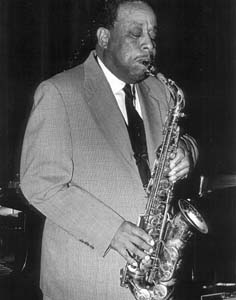![[Metroactive Music]](/music/gifs/music468.gif)
[ Music Index | San Jose | Metroactive Central | Archives ]
 Brother Soul: Sax player Lou Donaldson often harks back in the jazz tradition past Charlie Parker to a Kansas City-swing sound.
Brother Soul: Sax player Lou Donaldson often harks back in the jazz tradition past Charlie Parker to a Kansas City-swing sound.
The Blues (And Funk) Of Jazz Everything sax man Lou Donaldson does is funky By Rob Pratt IT WOULD BE EASY to forget, listening to contemporary mainstream jazz, that the music ultimately derives from the blues. Beboppers like Charlie Parker launched an enduring revolution in jazz with a deeply sophisticated harmonic sensibility consciously modeled on the ideas of French impressionist composers like Debussy and Ravel. But even at his most orchestral moments, Parker was undeniably playing the blues. Saxman Lou Donaldson--who appears this week at the Stanford Jazz Festival--has never lost sight of that vital tradition. Despite little name recognition among jazz purists, his signature sound (an instrumentation and feel in the rhythm section of the groups he leads as much as an approach to sax playing ) is instantly recognizable--and, with his funkier records prized among the collections of jungle, big beat and electronica DJs and record producers, undergirds much of contemporary pop music. These days, Donaldson's sound is labeled acid-jazz, but wrongly so. Acid-jazz originated in London and New York dance clubs during the late '80s as DJs discovered deeply groovy jazz sides turned out during the '60s and '70s by the likes of Donaldson, Gene Ammons, Grant Green and dozens of Hammond organ-playing band leaders. When Donaldson first started laying bluesy licks over a skittering organ-and-drums groove during the late '50s, it was called soul-jazz, and it quickly earned the disdain of mainstream jazz players and jazz critics who lamented such a "commercial" sound. But there's no questioning Donaldson's jazz qualifications. Inspired by Parker, Donaldson headed to New York in 1950 at age 24, soon landing steady gigs with Thelonious Monk, Milt Jackson and Charles Mingus and becoming part of the original incarnation of Art Blakey's Jazz Messengers. He soon put together his own bands and by the end of the decade had replaced the piano and bass in his groups with an organ player. Even on straightforward soul-jazz classics like "The Scorpion," "Brother Soul," "It's Your Thing" and "Alligator Boogaloo," Donaldson plays with strong ideas and a facile technique. Where tenor saxman Ammons turned on the burn to build intensity in his improvisations--honking, growling and reaching into the wailing top reaches of the instrument--alto player Donaldson lays back and gets deeper and deeper blue. At times, he harks back in the jazz tradition past Parker to a Kansas City-swing sound, and at others he bops with the best. It's all jazz--and all blues--and it's an approach that has earned Donaldson many devoted acolytes. Karl "Diesel" Denson (late of the Greyboy Allstars and now with his own band, Karl Denson's Tiny Universe) is quick to credit Donaldson as a primary influence, and Dave Ellis' playing puts him in a direct lineage. Denson and Ellis, though, like Donaldson, often don't receive their due among mainstream jazz audiences because they play joints where people get up and dance instead of highbrow concert halls. Even so, it's a good bet that soul-jazz players have a more prominent place in popular musical consciousness than even the top purveyors of contemporary mainstream jazz. For Donaldson, that's a vindication for his "commercial" sound, which has proven far more enduring than the rarefied movements in jazz prevalent when he first got funky.
Lou Donaldson and the Lonnie Smith Quartet appear at the Stanford Jazz Festival Saturday (July 8) at 8pm at Dinkelspiel Auditorium, Stanford. Tickets are $25. The festival continues through Aug. 5. Next weekend's featured performers are the Jesus Díaz Quintet (July 14) and Eddie Marshall and Holy Mischief (July 15) (650.725.ARTS) [ San Jose | Metroactive Central | Archives ]
|
From the July 6-12, 2000 issue of Metro, Silicon Valley's Weekly Newspaper.
Copyright © 2000 Metro Publishing Inc. Metroactive is affiliated with the Boulevards Network.
For more information about the San Jose/Silicon Valley area, visit sanjose.com.